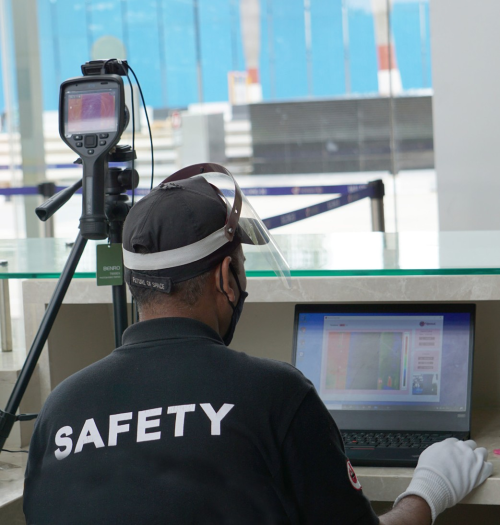Born-again business
-
- from Shaastra :: vol 01 edition 01 :: May - Jun 2021
When COVID-19 disrupted health tech start-up Niramai’s revenue model, the company innovated to secure a lifeline.
GEETHA MANJUNATH was happy that her health tech start-up Niramai was finally taking off after four years of hard work. She had left the corporate world after 25 years, to start this company in 2016. It was personal: two of her relatives had been diagnosed with cancer, both at late stages. That’s not unusual: one in every 12 women is at the risk of developing breast cancer, a leading cause of cancer deaths in the world. In most cases, breast cancer is detected in later stages, when it’s too late. The problem vexed Manjunath, who led the data analytics lab at Xerox Research Centre India, and she came up with a low-cost solution that could be used to detect cancer in the early stages. And Niramai was born.
Starting up was hard. But things picked up as the company hacked away at the problem, and Niramai’s artificial intelligence-based breast cancer screening solution gained acceptance. The idea was to use an infrared camera to measure temperature variations on the chest and to identify patterns that can detect abnormalities as opposed to the traditional way of using X-ray mammograms or Magnetic Resonance Imaging (MRI). Regulatory approvals were in place, and more than 30 hospitals had deployed the solution. The start-up had ten US patents to its name. More than 30,000 women had been screened for breast cancer with Niramai’s solution. Venture capital firm BEENEXT had invested $6 million in the company in 2019. Now it was time to go big.
But then in March 2020, the company suffered a blow. The COVID-19 pandemic raged across the world. In India, the government enforced a rigorous lockdown, and the healthcare system was put in disarray. “There was a sharp drop in the number of screenings, particularly in hospitals, as people didn’t want to go in for non-critical tests,” recalls Manjunath.

THE SMART PIVOT
But Manjunath and the team were quick to connect a new market need with their expertise. Given a set of images captured by a thermal camera, Niramai’s system, called Thermalytix, could discern breast cancer. The question now was: by using similar methods, can people entering a building be screened for fever, a symptom of COVID-19?
“During the lockdown, it became a guideline that anyone entering an office space should be screened for fever. We used thermal cameras for our daily living, and I felt we could do something about this,” recalls Manjunath. Infrared thermometers were prone to errors. Sometimes readings differed based on the distance at which the infrared thermometers were kept.
The same technology used to screen patients for cancer is being harnessed in COVID-19 times to scan crowds for high temperatures.
The Niramai team wrote up a new software, FeverTest. With this, people entering a building could be screened from a distance. The thermal camera would capture temperature data from people and relay it to a computer; FeverTest would identify people with abnormal temperature. But temperature could not be the only marker to screen for COVID-19. So the team also analysed breathing patterns and baked that into the solution. “All this is done in a seamless fashion, as with a CCTV,” Manjunath said. With the new solution in hand, she approached her mentor and Biocon founder Kiran Mazumdar-Shaw and asked if she could test the system out at Biocon’s office in Bengaluru. Shaw agreed.
FeverTest is now able to pick out people with fever from a distance, so no one needs to come in contact with a potential COVID-19-positive person. Several buildings in Bengaluru, including more than 20 from the builder RMZ, and the offices of Morgan Stanley and Kotak Mahindra Bank in Mumbai have deployed the contactless screening solution. The camera can also pick out people from a crowd if they aren’t wearing a mask. It can cost up to ₹6 lakh to deploy a full-feature solution capable of detecting fever even if several people are walking by at the same time. A mobile version of the solution costs up to ₹1 lakh. “There are also monthly subscription models, so it can be deployed widely,” said Manjunath. The system can detect temperature with an accuracy of up to 0.5ºCelsius and flag someone without a mask 98 per cent of the time.
NEW REVENUE STREAM
“It started as an experiment, but it has become a new product and a revenue stream for us,” said Manjunath.
In January, this writer walked into one of the many buildings at RMZ Ecoworld, a 77-acre special economic zone in suburban Bengaluru. Every day, thousands of employees stream into technology companies housed in these buildings. Manually screening everyone for COVID-19 symptoms would have been virtually impossible. But there it was, a camera behind the receptionist’s desk, along with safety personnel, effortlessly temperature-scanning people entering the building. Occasionally, a robovoice called out to a maskless passerby: “Please wear a mask.” FeverTest appears to be doing its job. As we enter the post-pandemic world, in which epidemiologists predict the occurrence of COVID-19-like diseases, solutions like Niramai’s may yet become a permanent fixture.
Have a
story idea?
Tell us.
Do you have a recent research paper or an idea for a science/technology-themed article that you'd like to tell us about?
GET IN TOUCH














